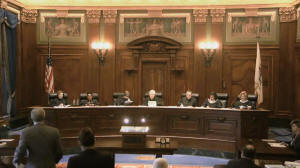Illinois candidates’ ballot access in the hands of Illinois Supreme
Court
 Send a link to a friend
Send a link to a friend
 [July 11, 2024]
By Catrina Petersen | The Center Square [July 11, 2024]
By Catrina Petersen | The Center Square
(The Center Square) – A hastily changed law that eliminates slated
candidates from gaining ballot access without running in a primary was
deemed unconstitutional by a lower court, but now an expected Illinois
Supreme Court decision could determine if candidates this election are
on the Nov. 5 ballot.
Thirteen candidates are plaintiffs in the lawsuit Collazo et al v.
Illinois State Board of Elections and Attorney General Kwame Raoul,
which is currently on appeal before the Illinois Supreme Court. The
hastily passed law enacted by Gov. J.B. Pritzker prohibits slated
candidates for established political parties from getting their name on
the ballot without first running in a primary. Leslie Collazo, the lead
plaintiff challenging the law change, had her petitions challenged.
“I turned in over 80 petitions and over 1,200 signatures, and many of
them were objected to and they tried to toss out the majority and we sat
there line-by-line and we had a two-day process to go through every
single signature, but by the end of the first day they threw in the
towel and decided to not pursue an objection based on my signature
because after the first day, it was clear I had enough. So on the basis
of signatures, I have the green light, the only thing holding me back is
this law,” said Collazo.
At the July 9 Illinois State Board of Elections meeting, the board
sustained an objection against one of the 14 plaintiffs, Timothy
Szymankowski, a slated candidate in the 98th House district, so he will
not be on the November ballot. His objection did cite the new slating
law but it also said he did not submit the required 500 signatures.
“The hearing officer’s report said he submitted only 331 signatures and
both the hearing officer and our general counsel recommended the
objection be sustained on that count alone. The board voted
accordingly,” Matt Dietrich, Illinois State Board of Elections
spokesman, told The Center Square.
Collazo explained that whoever seeks ballot access has to have thick
skin.
“I can’t stress enough how disheartening it is to just want to do good
for our cities, towns and country and the amount of opposition to just
bring a fair fight to the ring,” said Collazo.

[to top of second column]
|

The Illinois Supreme Court
BlueRoomStream

Collazo, if on the Nov. 5 ballot, will face incumbent state Rep. La
Shawn Ford, D-Chicago.
The Collazo case could be decided by the Illinois Supreme Court possibly
as early as this week, according to Dietrich.
Collazo said she’d prefer to campaign and let voters know they have an
option this year, but instead she and the others are tied up in court.
“I do feel positive about how the Supreme Court will rule. If the lower
court found it unconstitutional then I suspect the Supreme Court will
find it unconstitutional for them [the legislature] to pass this bill in
the middle of the [election] process,” said Collazo.
Thirteen of the 14 plaintiffs in that lawsuit still have objections
pending based on the slating law.
The other candidate facing an objection based on the slating law is Jay
Keeven in the 112th House district. He was not a plaintiff in the
lawsuit but, according to the Illinois State Board of Elections, the
Supreme Court’s decision will likely determine the outcome of his
objection as well.
Collazo said she was encouraged by the fact the decision made by the
court will possibly help someone who isn’t a plaintiff.
“I know myself along with the other plaintiffs and whoever this helps,
we want to go all the way with this [case] and we’re really hoping for
the best outcome for not only the candidates but the voters,” said
Collazo.
The plaintiffs challenged the new slating law and won in Sangamon County
Circuit Court. The attorney general appealed that ruling directly to the
Illinois Supreme Court and the court’s decision could likely determine
whether the new slating law can be used to sustain the objections
against 14 candidates and prevent them from being certified to the
ballot by the state elections board at its Aug. 23 meeting. |